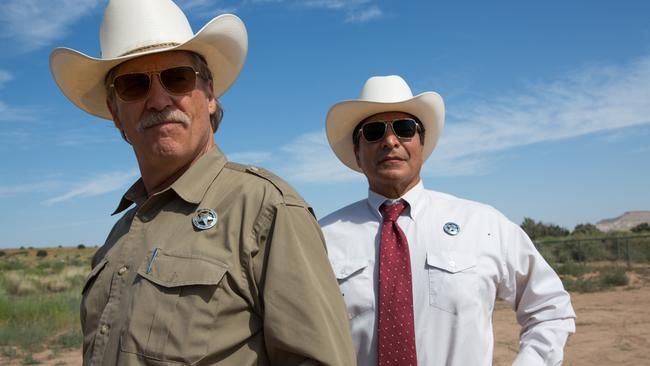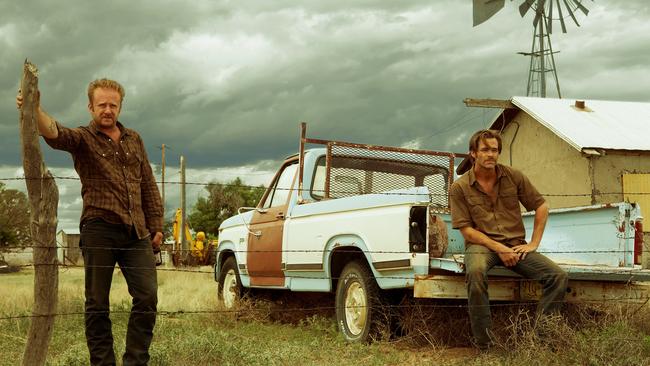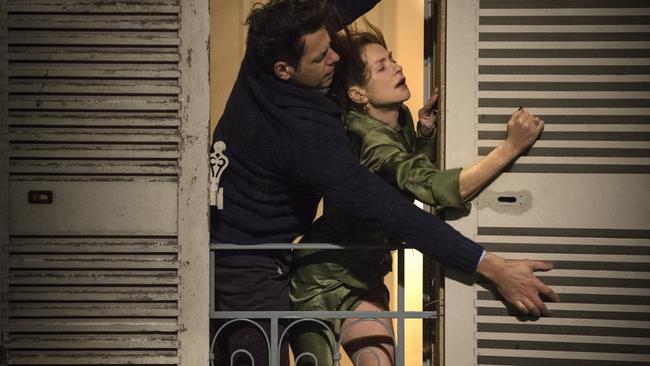Film reviews: Hell or High Water; Elle with Isabelle Huppert
Stop me if you’ve heard this one before. A disenfranchised duo roam the Texas badlands robbing banks …

“God I love West Texas!” exclaims Marcus (Jeff Bridges), a veteran Texas Ranger, at one point in Hell or High Water, a very fine new thriller, but you’d be hard put to understand why he feels that way unless, like Marcus, you were a native. The small towns with their shuttered shops, dilapidated houses, idle men and general air of neglect and decay are not that easy to become affectionate about, but these are the Texas Badlands and this is the aftermath of the global financial crisis.
Many Texans blame the banks for their misery, just as they did 80 years ago when Bonnie and Clyde roamed the same parts of America robbing the banks they saw as being the cause of the Depression (“We rob banks!” they explain, proudly, in Arthur Penn’s great 1967 film about their exploits), and the wheel has turned full circle since then. The protagonists of the film, Toby (Chris Pine) and Tanner (Ben Foster), are brothers who are angry and frustrated at the way banks, especially the Texas Midland Bank, have treated them — and they’re determined to be avenged; they’re the Bonnie and Clyde of their day.

Toby is the mastermind, though that’s making him sound more intelligent than he is. His grievance stems from the fact Texas Midland is about to foreclose on the mortgage of his family property. The recent death of his mother has brought matters to a head, but Toby is infuriated because oil has recently been discovered on the property and the bank won’t give him time to profit from the discovery; it wants immediate eviction. So Toby recruits Tanner, who is just out of prison, to help him. Toby is calm and methodical, while Tanner is anything but, a violent loose cannon, superbly played by Foster. Toby is not a bad man, except, of course, in the eyes of the law.
And so the brothers rob Texas Midland banks in the smaller towns where there are no surveillance cameras; they take only modest amounts of cash and they bury their getaway cars. Toby, at least, wants to avoid violence; Tanner isn’t so fussy about things like that.
Inevitably the robberies capture the attention of the law, which is where the weary Marcus (Jeff Bridges) and his Native American deputy, Alberto (Gil Birmingham), come in. Marcus is extremely astute and he instinctively guesses where the next robbery might occur; it’s only a question of waiting, and while Marcus and Alberto wait they indulge in teasing banter that indicates just how fond these colleagues and mates are of one another.
Scottish director David Mackenzie employs the keen eye of an outsider to evoke this very particular world (although the film was shot not in Texas but in New Mexico). The film is firmly planted in reality, down to the smallest detail (the cafe waitress who informs her customers proudly that she serves only T-bone steaks and then goes on to reminisce about the New Yorker who, back in the 1980s, was dumb enough to ask if fish was on the menu). The major performances are spot on, with Bridges giving one of his finest late performances as the ageing cop. Hell or High Water is a thriller with something to say about contemporary America, a message it delivers without thrusting it down the throat of the viewer. It’s a small gem.

Dutch director Paul Verhoeven has been criticised in the past for so-called exploitation films such as Basic Instinct (1992), Showgirls (1995) and Starship Troopers (1997), but the fascinating thing about this very talented filmmaker is that since his earliest Dutch films (he made the first in 1971) he has succeeded in combining mainstream genres with a scathing critique of society, a critique that seems to have gone over the heads of many in respect of his Hollywood movies. He hadn’t made a film for 10 years when his latest, the French-German production Elle, screened this year at the end of the Cannes competition, and left without any awards. I haven’t seen all of the other competing films, but they’d have to be pretty great if this challenging, at times brilliant, movie went away empty-handed.
The film begins with a violent rape; we hear the sounds first, the crashing of furniture, the breaking of crockery, the cries of the victim, before we see Michele LeBlanc (Isabelle Huppert) has been violently attacked in her home by a masked stranger dressed entirely in black, the only witness being her cat. It’s a shocking opening sequence, but if you expect that what follows will be a rape-revenge thriller, you’d be mistaken, though there are elements of this. After the assault, Michele cleans up, takes a bath and carries on with her life, making sure she’s tested for viruses — she doesn’t call the police.
Michele, we learn as the film progresses, has lived a most unusual life. When she was 10, her father went on a rampage during which he killed 27 people; he’s still in prison. Her mother, Irene (Judith Magre), is involved in an affair with a man younger than Michele. Her son, Vincent (Jonas Bloquet), is hopelessly in love with the pretty but bad-tempered Josie (Alice Isaaz), and blind to the obvious fact their baby isn’t his. Her ex-husband, Richard (Charles Berling), a penniless writer, is involved with a new girlfriend, Helene (Vimala Pons). Her partner in a video game company — where the imagery is graphically sexual and violent — is Anna (Anne Consigny), who is also her best friend. But that friendship hasn’t stopped Michele from having a secret affair with Anna’s husband, Robert (Christian Berkel). And then there’s Patrick (Laurent Lafitte), the handsome neighbour from across the street whose wife, Rebecca (Virginie Efira), is so religious she insists on saying grace before eating at Michele’s home.
The screenplay by David Birke is based on a novel, Oh … by Philippe Djian, and as you will see from the above it’s filled with intriguing characters. Michele is the focus, and we sympathise with her because she was the victim of a brutal sexual assault; but in many ways she’s an unpleasant woman — she treats her mother and her best friend badly, and thinks nothing of damaging her ex-husband’s car as she forces her way into a parking space. She’s no innocent, that’s for sure, and Huppert portrays her with brilliance — this is one of her greatest roles in a long and illustrious career. “Shame isn’t an emotion to stop us doing anything,” she tells Anna at one point, and maybe her childhood trauma has resulted in her ruthless, manipulative approach to life.
This dark and sometimes grimly amusing film has been compared to the work of Brian de Palma, but to me it seems more like a blending of Hitchcock and Luis Bunuel, with a great music score by Anne Dudley accompanying the pristine camerawork of Stephane Fontaine. The film is France’s entry in this year’s foreign language Oscar race, and it deserves a better result than it achieved in Cannes — although by its very nature it’s bound to be contentious and even divisive.
Hell or High Water (MA15+)
4 stars
National release
Elle (MA15+)
4.5 stars
National release




To join the conversation, please log in. Don't have an account? Register
Join the conversation, you are commenting as Logout